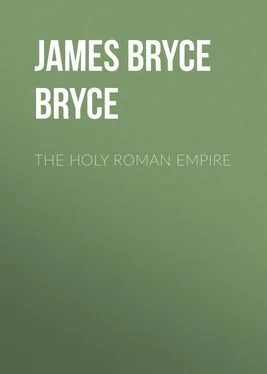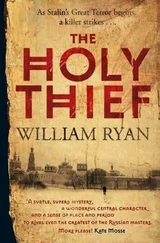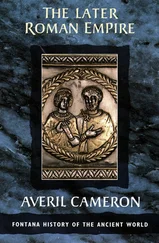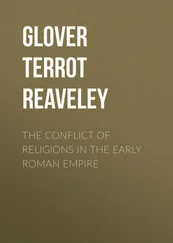James Bryce - The Holy Roman Empire
Здесь есть возможность читать онлайн «James Bryce - The Holy Roman Empire» — ознакомительный отрывок электронной книги совершенно бесплатно, а после прочтения отрывка купить полную версию. В некоторых случаях можно слушать аудио, скачать через торрент в формате fb2 и присутствует краткое содержание. Жанр: foreign_antique, foreign_prose, Историческая проза, на английском языке. Описание произведения, (предисловие) а так же отзывы посетителей доступны на портале библиотеки ЛибКат.
- Название:The Holy Roman Empire
- Автор:
- Жанр:
- Год:неизвестен
- ISBN:нет данных
- Рейтинг книги:4 / 5. Голосов: 1
-
Избранное:Добавить в избранное
- Отзывы:
-
Ваша оценка:
- 80
- 1
- 2
- 3
- 4
- 5
The Holy Roman Empire: краткое содержание, описание и аннотация
Предлагаем к чтению аннотацию, описание, краткое содержание или предисловие (зависит от того, что написал сам автор книги «The Holy Roman Empire»). Если вы не нашли необходимую информацию о книге — напишите в комментариях, мы постараемся отыскать её.
The Holy Roman Empire — читать онлайн ознакомительный отрывок
Ниже представлен текст книги, разбитый по страницам. Система сохранения места последней прочитанной страницы, позволяет с удобством читать онлайн бесплатно книгу «The Holy Roman Empire», без необходимости каждый раз заново искать на чём Вы остановились. Поставьте закладку, и сможете в любой момент перейти на страницу, на которой закончили чтение.
Интервал:
Закладка:
15
Athaulf formed only to abandon it.
16
See, among other passages, Varro, De lingua Latina , iv. 34; Cic., Pro Domo , 33; and in the Corpus Iuris Civilis , Dig. i. 5, 17; l. 1, 33; xiv. 2, 9; quoted by Ægidi, Der Fürstenrath nach dem Luneviller Frieden . The phrase 'urbs æterna' appears in a novel issued by Valentinian III.
Tertullian speaks of Rome as 'civitas sacrosancta.'
17
Lact. Divin. Instit. vii. 25: 'Etiam res ipsa declarat lapsum ruinamque rerum brevi fore: nisi quod incolumi urbe Roma nihil istiusmodi videtur esse metuendum. At vero cum caput illud orbis occident, et ῥύμη esse cœperit quod Sibyllæ fore aiunt, quis dubitet venisse iam finem rebus humanis, orbique terrarum? Illa, illa est civitas quæ adhuc sustentat omnia, precandusque nobis et adorandus est Deus cœli si tamen statuta eius et placita differri possunt, ne citius quam putemus tyrannus ille abominabilis veniat qui tantum facinus moliatur, ac lumen illud effodiat cuius interitu mundus ipse lapsurus est.'
Cf. Tertull. Apolog. cap. xxxii: 'Est et alia maior necessitas nobis orandi pro imperatoribus, etiam pro omni statu imperii rebusque Romanis, qui vim maximam universo orbi imminentem ipsamque clausulam sæculi acerbitates horrendas comminantem Romani imperii commeatu scimus retardari.' Also the same writer, Ad Scapulam , cap. ii: 'Christianus sciens imperatorem a Deo suo constitui, necesse est ut ipsum diligat et revereatur et honoret et salvum velit cum toto Romano imperio quousque sæculum stabit: tamdiu enim stabit.' So too the author – now usually supposed to be Hilary the Deacon – of the Commentary on the Pauline Epistles ascribed to S. Ambrose: 'Non prius veniet Dominus quam regni Romani defectio fiat, et appareat antichristus qui interficiet sanctos, reddita Romanis libertate, sub suo tamen nomine.' – Ad II Thess. ii. 4, 7.
18
For example, by the 'restitutio natalium,' and the 'adrogatio per rescriptum principis,' or, as it is expressed, 'per sacrum oraculum.'
19
Even the Christian Emperors took the title of Pontifex Maximus, till Gratian refused it: ἀθέμιστον εἶναι Χριστιάνῳ τὸ σχῆμα νομίσας. – Zosimus, lib. iv. cap. 36.
20
'Maiore formidine et callidiore timiditate Cæsarem observatis quam ipsum ex Olympo Iovem, et merito, si sciatis… Citius denique apud vos per omnes Deos quam per unum genium Cæsaris peieratur.' – Tertull. Apolog. c. xxviii.
Cf. Zos. v. 51: εἰ μὲν γὰρ πρὸς τὸν θεὸν τετυχήκει διδόμενος ὅρκος, ἦν ἂν ὡς εἰκὸς παριδεῖν ἐνδίδοντας τῇ τοῦ θεοῦ φιλανθρωπίᾳ τὴν ἐπὶ τῇ ἀσεβείᾳ συγγνώμην. ἐπεὶ δὲ κατὰ τὴν τοῦ βασιλέως ὀμωμόκεσαν κεφαλῆς, οὐκ εἶναι θεμιτὸν αὐτοῖς εἰς τὸν τοσοῦτον ὅρκον ἐξαμαρτεῖν.
21
Tac. Ann. i. 73; iii. 38, etc.
22
It is curious that this should have begun in the first years of the Empire. See, among other passages that might be cited from the Augustan poets, Virg. Georg. i. 42; iv. 462; Hor. Od. iii. 3, 11; Ovid, Epp. ex Ponto , iv. 9. 105.
23
Hence Vespasian's dying jest, 'Ut puto, deus fio.'
24
ὅπου ἂν ὁ βασιλεὺς ᾖ, ἐκεῖ ἡ Ῥώμη. – Herodian.
25
If the accounts we find of the Armorican republic can be trusted.
26
Odoacer or Odovaker, as it seems his name ought to be written, is usually, but incorrectly, described as a King of the Heruli, who led his people into Italy and overthrew the Empire of the West; others call him King of the Rugii, or Skyrri, or Turcilingi. The truth seems to be that he was not a king at all, but the son of a Skyrrian chieftain (Edecon, known as one of the envoys whom Attila sent to Constantinople), whose personal merits made him chosen by the barbarian auxiliaries to be their leader. The Skyrri were a small tribe, apparently akin to the more powerful Heruli, whose name is often extended to them.
27
Αὔγουστος ὁ Ὀρέστου υἱὸς ἀκούσας Ζήνωνα πάλιν τὴν βασιλείαν ἀνακεκτῆσθαι τῆς ἕω … ἠνάγκασε τὴν βουλὴν ἀποστεῖλαι πρεσβεῖαν Ζήνωνι σημαίνουσαν ὡς ἰδίας μὲν αὐτοῖς βασιλείας οὐ δέοι, κοινὸς δὲ ἀποχρήσει μόνος ὢν αὐτοκράτωρ ἐπ' ἀμφοτέροις τοῖς πέρασι. τὸν μέντοι Ὀδόαχον ὑπ' αὐτῶν προβεβλῆσθαι ἱκανὸν ὄντα σώζειν τὰ παρ' αὐτοῖς πράγματα πολιτικὴν ἐχὼν νοῦν καὶ σύνεσιν ὁμοῦ καὶ μάχιμον. καὶ δεῖσθαι τοῦ Ζήνωνος πατρικίου τε αὐτῷ ἀποστεῖλαι ἀξίαν καὶ τὴν τῶν Ἰτάλων τουτῷ ἐφεῖναι διοίκησιν. – Malchus ap. Photium in Corp. Hist. Byzant.
28
Not king of Italy, as is often said. The barbarian kings did not for several centuries employ territorial titles; the title 'king of France,' for instance, was first used by Henry IV. Jornandes tells us that Odoacer never so much as assumed the insignia of royalty.
29
Sismondi, Histoire de la Chute de l'Empire Occidentale .
30
'Nil deest nobis imperio vestro famulantibus.' – Theodoric to Zeno: Jornandes, De Rebus Geticis , cap. 57.
31
'Unde et pæne omnibus barbaris Gothi sapientiores exstiterunt Græcisque pæne consimiles.' – Jorn. cap. 5.
32
Theodoric (Thiodorich) seems to have resided usually at Ravenna, where he died and was buried; a remarkable building which tradition points out as his tomb stands a little way out of the town, near the railway station, but the porphyry sarcophagus, in which his body is supposed to have lain, has been removed thence, and may be seen built up into the wall of the building called his palace, situated close to the church of Sant' Apollinare, and not far from the tomb of Dante. There does not appear to be any sufficient authority for attributing this building to Ostrogothic times; it is very different from the representation of Theodoric's palace which we have in the contemporary mosaics of Sant' Apollinare in urbe.
In the German legends, however, Theodoric is always the prince of Verona (Dietrich von Berne), no doubt because that city was better known to the Teutonic nations, and because it was thither that he moved his court when transalpine affairs required his attention. His castle there stood in the old town on the left bank of the Adige, on the height now occupied by the citadel; it is doubtful whether any traces of it remain, for the old foundations which we now see may have belonged to the fortress erected by Gian Galeazzo Visconti in the fourteenth century.
33
'Igitur Chlodovechus ab imperatore Anastasio codicillos de consulatu accepit, et in basilica beati Martini tunica blatea indutus est et chlamyde, imponens vertici diadema … et ab ea die tanquam consul aut (=et) Augustus est vocitatus.' – Gregory of Tours, ii. 58.
Читать дальшеИнтервал:
Закладка:
Похожие книги на «The Holy Roman Empire»
Представляем Вашему вниманию похожие книги на «The Holy Roman Empire» списком для выбора. Мы отобрали схожую по названию и смыслу литературу в надежде предоставить читателям больше вариантов отыскать новые, интересные, ещё непрочитанные произведения.
Обсуждение, отзывы о книге «The Holy Roman Empire» и просто собственные мнения читателей. Оставьте ваши комментарии, напишите, что Вы думаете о произведении, его смысле или главных героях. Укажите что конкретно понравилось, а что нет, и почему Вы так считаете.












